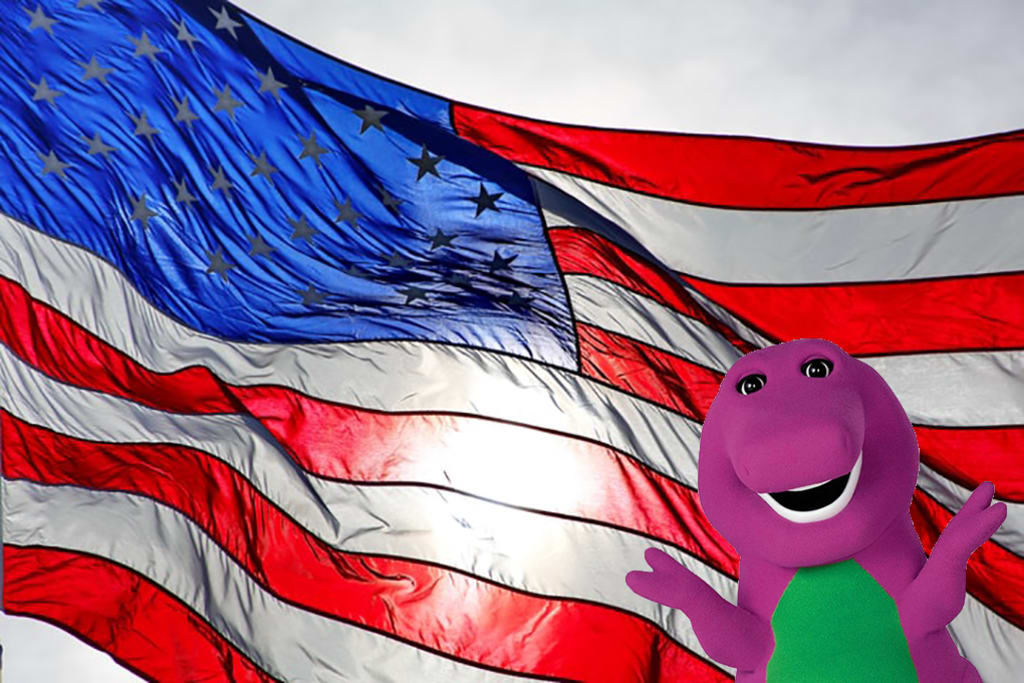
" Get up...get up...get outta the rack! Drop your cucks and grab your socks and get on line! Do it! Move"
The United States Marine Corps Boot Camp. It's everything you've been told about, everything you've had nightmares about, and more. Why then do so many young hard-chargers decide to quit the Corps after only four years of service, some even before their first tour of duty is over? I'm convinced the problem begins long before they ever report to one of two recruit training depots and stand on the yellow footprints for the first time. Before we get into the possible causes and solutions, please allow me to tell you a little backstory that I hope will help you understand what motivated me to write this story.
First, I'm an old Marine. I served my country and retired long before most of today's Generals even graduated school. So things have changed considerably when it comes to warfighting capabilities. One thing that hasn't changed is the Marine Corps' focus on lore and tradition. We have been called a cult because of the way we recruit, condition, and carry on our Marine Corps beliefs. In my opinion, that's okay because it's all about honor and duty which are two things any country should demand of their warriors. Make no mistake, Marines are and forever will be warriors. I have been blessed to continue relationships with several brethren I served with but those numbers dwindle as time passes and age catches up with us. Fortunately, through social media, I've kindled new relationships with both active and retired Marines. One of these Marines, a currently serving active duty Colonel and I have had several conversations about disciplinary issues with the younger troops and I think we are in agreement that many of these issues may stem from outright boredom. I've furthered this belief with supporting conversations with other field grade officers and senior non-commissioned officers. I've yet to have a direct conversation with junior troops because they're fearful of speaking with people they don't know on social media, which is a good thing!
Now that you understand the backstory, let's get to the point the only way I know how, Barney-style. Imagine you are an 18-year-old young person graduating high school with no definite plans on what your immediate future looks like so you listen to your local recruiter and end up in the military on a four-year contract. The recruiter promised you a skill that would put you light years ahead of your competition, real-world experience that would settle any doubt about your ability, and adventures that included travel and missions that would excite and tame your libido.
Once you arrived at recruit training, you had it drummed into you about how your pending membership in the fiercest warrior organization that has ever walked the earth. You receive daily lectures about heroes who gave life and limb defending their fellow warriors and our country. You are shown the photographs and hear the stories of the Marines known as legends. You're instructed in the meaning of everything a Marine wears and does down to how and why they tie their shoelaces a certain way to how they respond to superiors. Once you graduate the Crucible and have earned the title of Marine, you are sent for further training and finally to the fleet for what you believe will be the start of an adventure that may allow you to become a legend too.
Instead, you find yourself tucked away inside a giant system, working shiftwork, living in a giant dormitory with people you don't know and probably don't like and you're being forced-fed daily lectures on how the color of your skin has either privileged or enslaved you for the rest of your life. This is the polar opposite of what these kids imagined their adventures in the Corps would be like and it's not what their recruiters told them it would be like.
To make matters worse, we are graduating these kids from the toughest warrior training on the planet earth at the ripe old age of 18 years, and sending them out into the world with little to no supervision on how to behave in society. Yes, there are a myriad of training schools they attend and yes, some are better equipped than others, but as I and several of the senior leaders in the Corps have discussed, it doesn't change the fact, these leaders are constantly dealing with behavioral issues, older more mature Marines don't have. I don't want this to digress into a "back in the Old Corps" conversation because this isn't about what happened in the past. It's about real-life issues happening today. We have young Marines who leave home where they may have had strict supervision or not, they are thrust into an environment where they cannot even blink without being told to do so, then suddenly they are set free where as long as they meet their duty assignments, they are free to come and go as they please and we give them money to do so.
It's no wonder many of them get involved in relationships and marry too soon for the wrong reasons, become alcoholics, commit crimes, or worse. And please don't misunderstand me. Unit leaders are very much aware of these issues. They deal with them every day. The Corps has mechanisms in place that allow Commanders to mete out non-judicial punishment and if that doesn't work, a really troublesome Marine can be court-martialed and separated from the Corps. But these aren't solutions. I've yet to meet a Commander or a Sergeant Major who relished the idea of NJP or a court-martial. They would much rather approach this from a position of solving the problem so it doesn't occur in the future with other Marines. It's important that I interject here another personal aspect to this story. My father and his father before him and my son are all Marines too. It's a family kind of thing. With this in mind, I probably gave more thought to this than I should have. After all, I'm not on the payroll anymore. It's someone else's problem right? Sadly, that's just not how I think, especially when I saw my own son faced with some of these problems himself and later as a junior NCO.
I reached out via social media to any Marine willing to discuss this with me and I learned several things. I learned that junior Marines are still pretty good at pointing fingers and blaming others for their own shortcomings. I also learned that senior Marines are still pretty good at toeing the company line. In other words, it wasn't going to be easy to get anyone to admit what the real issues were. Now, if you've stuck around this long, I'm glad. It means I've captured your attention. The cliche that good things happen to people who wait is apropos here because I intentionally held off on spelling out the real issues. I only wanted the serious readers to stick around because you are the ones who can help the most. The real issue here is expectations.
For the junior Marine who just graduated boot camp, they expect to be thrust into a well-organized, mission-oriented unit where everyone looks out for each other and takes care of each other. Junior Marines expect their experiences to mimick what their recruiters and drill instructors told them. Junior Marines did not expect to be assigned to late-night duty shifts, where they are ridiculed for being motivated and punished for making mistakes for things they may not have fully understood. Nor did junior Marines expect to be stuck in a dead-end job with no hope for advancement or promotion. I could go on and on, but suffice it to say, the Marine Corps recruiting program failed to provide the proper expectations for these junior Marines.
On the flip side, Unit Commanders and Senior Non-Commissioned Officers didn't sign up to be anyone's babysitter. They expect every Marine under their command to be mission-ready at all times. When that Colonel or Sergeant Major suddenly learns that in addition to keeping his unit capable of performing all tasks assigned to them, they must also act as drug and alcohol counselors, marriage counselors, financial advisors, and generally speaking, parents in absentee, it can be emotionally tasking on the leadership. Now that the Secretary of Defense has ordered all service branches to implement additional social policies, the rank and file leadership are faced with having to make more expeditious decisions than ever before. Instead of working with a borderline problem Marine who is really good at his job, the Unit Commander is just as apt to recommend a general court-martial and send him/her home.
So what exactly is the solution? How can the Marine Corps fix a problem that has been brewing for many years and is now, in some cases, overwhelming some commands? What is the best way forward that won't require a complete change of direction or cost a ton of money to implement? What I'm about to suggest may sound harsh. It may even solicit laughter from those who don't want to see any change. There's an old saying amongst all of the service branches that goes, "Rank Has Its Privileges!"
There's an old saying amongst all of the service branches that goes, "Rank Has Its Privileges!"
What exactly does this mean? In a nutshell, the higher you go in rank, the more privileges you are granted. This isn't meant to punish the junior ranks. It's meant to reward those Marines who are mature and skilled enough to warrant certain privileges. Some will argue this point with me, but I know of no other way to prevent the 18 or 19-year-old junior Marine from getting a DWI offense or other substance abuse offense. More specifically, if junior Marines aren't given the same freedoms that more senior Marines have earned, then they have less of a chance to get into trouble.
Most junior Marines graduate recruit training between the ages of 18 and 20 years of age. By the time they finish their schooling, many will still be teenagers. They should not be allowed to go off unchaperoned anywhere for any length of time. They are still very much vulnerable to the ways of the world. Some will argue they are warriors and will do as they're told. I would argue back look at the high rates of alcoholism, drug abuse, suicide, and criminal behavior among the ranks.
Continuing on, junior Marines have no business off base for extended periods of time. Again, this sounds harsh, but realistically, privates, privates first class, and even lance corporals are all considered non-rated ranks in the Marine Corps. As such, every minute of their day should be planned accordingly. Doing so would dramatically reduce the amount of time Unit Commanders spend on NJP and courts-martial. As these junior Marines promote upward to the NCO ranks, they gain privileges like the ability to marry, extended liberties off base, etc. I could go on and on, but I'm sure everyone this affects gets the drift. The major objection to this is senior Marines would also have to stick around to supervise them. Sadly, that's what you're supposed to do when you're in the service.
I recently found out that working parties are going away and that public services such as policing the grounds, mowing the lawns, picking up the trash, etc., are being outsourced to private companies for exhorbiant fees. Why? Police calls should be a mandatory part of every junior Marine's day. I could continue, but I think anyone that has stuck around this long understands my point.
I will close by stating that I also believe organized liberty calls should be the norm for the junior Marines. Everyone deserves a break, every so often. But for the junior Marines, put them in a dress uniform, make sure they understand the off-limits establishments, give them a curfew and turn them loose once or twice a month. Trust me when I say they will bond and become a more cohesive unit than any safety brief could ever hope to create. They will do everything in their power to prevent liberty calls from becoming endangered, the current one and the next one. And courts-martial and non-judicial punishments will become a rarity that is only used for those cases where they're actually needed.
The author served in the United States Marine Corps and has maintained close relationships with those he served with and those currently serving. My goal in writing this article isn't to criticize the Marines. Instead, I'm amplifying a conversation that is taking place all over the Marine Corps right now. Unit and Battalion leaders recognize that junior Marines have more disciplinary issues than ever before and aren't even attempting to re-enlist when their contracts expire. These same leaders are struggling with retention rates. I argue the point that many if not all of these junior Marines' expectations were mismanaged or not met to begin with. The kids still need parenting. So do it. You can find more of my writings here & here.
About the Creator
Joey Lowe
Just an old disabled dude living in Northeast Texas. In my youth, I wanted to change the world. Now I just write about things. More about me is available at www.loweco.com including what I'm currently writing about or you can tweet me.






Comments
There are no comments for this story
Be the first to respond and start the conversation.